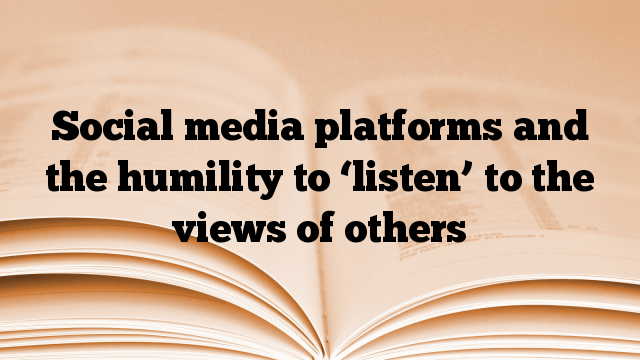“When a man who is honestly mistaken hears the truth, he will either quit being mistaken or cease to be honest.”
– Unknown.
My first child is in the boarding house in one of the Senior High Schools in Ghana. With current technology, it is possible for parents and teachers to interact and discuss the wellbeing of students on social media. So there is a WhatsApp platform for parents and some teachers in the house my child is in. This gives us the opportunity to know what is happening and to contribute to the welfare of our children in school. This is another advantage of current technology. Our parents did not have this opportunity when we were students decades ago. I do not take it for granted.
I belong to many social media platforms, from professional to social. They offer an opportunity to ‘meet’ new people with different perspectives. The discussions on these platforms can be a bit predictable when the group is homogeneous, for example, involving medical doctors, as I happen to be. When the membership is heterogeneous, like parents of students in a school, it can be tricky. People may have very different perspectives on different subjects that can bring heated arguments.
Last week, the school authorities asked a parent to go for his child who had been unwell for some time. The child had been seen at the school’s infirmary but was not getting better. The child was sent to the district hospital and brought back to the school, but still did not seem to feel well. At this point, the school authorities asked a parent to go to the school to take the child home and send her to a hospital. This is where the ‘problem’ began.
The parent was furious! He did not see why the school had to call a parent to come for a ward. The messages put on the platform were not nice, accusing the school authorities. As a parent whose child had been sick earlier in the school and gone to the infirmary and had been sent to the district hospital, I knew the processes. I thought the school had done the right things. I even had a chat with one of the teachers.
I introduced myself as a medical doctor on the platform and tried to explain the expected procedures. The parent remained angry and was even rude to me on the platform.
I tried to make the expected procedures clear on the platform. I asked a few questions:
- Is the girl so sick that she has to be admitted?
-
Has the school declined to send her to the hospital for admission?
-
Has the school asked for her to be discharged from the hospital (against medical advice)?
I ended my posts on the platform with a few questions:
- Are there lessons here for all of us?
-
Should the school authorities handle situations differently?
-
Should parents handle things differently or have different expectations?
If we don’t answer these, we shall have these disagreements many times with different students and parents.
I have decided to write this piece because I believe there are lessons for all parents and teachers in our schools. We need to understand the protocols and make sure there are best practices in our institutions for students who fall sick.
There is also another angle to this. Social media platforms often have different members from different backgrounds. One person cannot know everything. You may be an expert in your field but in another field, there may be someone who knows more than you. Even in medicine, in spite of my over 20 years of practice in Ghana, there are areas (in and outside my speciality) where others, even much younger than me, know more than I do.
It pays to be humble. When others express their opinions on issues, if we are patient, we may get good advice from others who know more than we do in the area.

